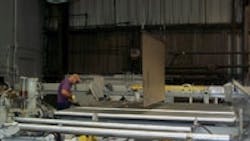Whether it's a cut finger, twisted ankle or something more serious, plant workers at the Duoline Technologies operations in Odessa, Texas, can depend on first-response personnel to come to their aid. Duoline, a subsidiary of conduit enclosure and oil field products manufacturer Robroy Industries Inc., has a team of 16 workers throughout the plant who don red shirts that identify them as safety-response specialists. The workers are trained and certified to administer first aid, CPR and automated external defibrillators.
They're all part of Robroy's companywide effort to improve safety over the past six years. In 2002 the company formed The Shield Program to reduce the number of injuries and accidents throughout its plants. The results have been encouraging with some plants reporting zero lost days in 2006 and 2007, while others reduced lost time to fewer than 30 days compared with more than 100 recorded before the program was implemented, the company reports.
From the beginning, Robroy's safety initiative has utilized employee input to make the program effective. A companywide development group composed of employees from each business department created standards and "non-negotiable safety criteria" based on the assumption that each worker knows his or her job better than anyone else.
"It's a great way to have an across-the-board way of doing things safety-wise," says Florence Burk, human resources administrator, Duoline Technologies. "The expectations are known, and it's a good way to get everybody's input when an injury occurs -- then we have a universal way to [administer] the process."
At the Duoline facility the company added an emergency stop switch at the back end of its casing machines in addition to switches already located on the front. This provides workers at both ends with the ability to shut down the machine in an emergency situation, according to Rocky Dyer, Duoline project manager.
The company's safety culture also extends into its products. At the company's Belding, Mich., plant where it makes Stahlin brand non-metallic enclosures, an operations worker brought a potential safety issue to the engineering group's attention. The employee, Mark Becker, lead associate for Stahlin's Hand Lay Up Group, noticed that one of its large industrial enclosures could tip forward onto a person if the doors were opened before the enclosure was secured to its mounting surface.
The engineering department responded by developing a stabilizing method and affixing a warning sticker on the outside of each door to warn customers of the tipping hazard, Becker notes. "While I was not concerned so much for Stahlin's internal processes, it was a definite concern to safeguard customers installing the units in the field," said Becker in a prepared statement.
See Also
About the Author
Jonathan Katz
Former Managing Editor
Former Managing Editor Jon Katz covered leadership and strategy, tackling subjects such as lean manufacturing leadership, strategy development and deployment, corporate culture, corporate social responsibility, and growth strategies. As well, he provided news and analysis of successful companies in the chemical and energy industries, including oil and gas, renewable and alternative.
Jon worked as an intern for IndustryWeek before serving as a reporter for The Morning Journal and then as an associate editor for Penton Media’s Supply Chain Technology News.
Jon received his bachelor’s degree in Journalism from Kent State University and is a die-hard Cleveland sports fan.
